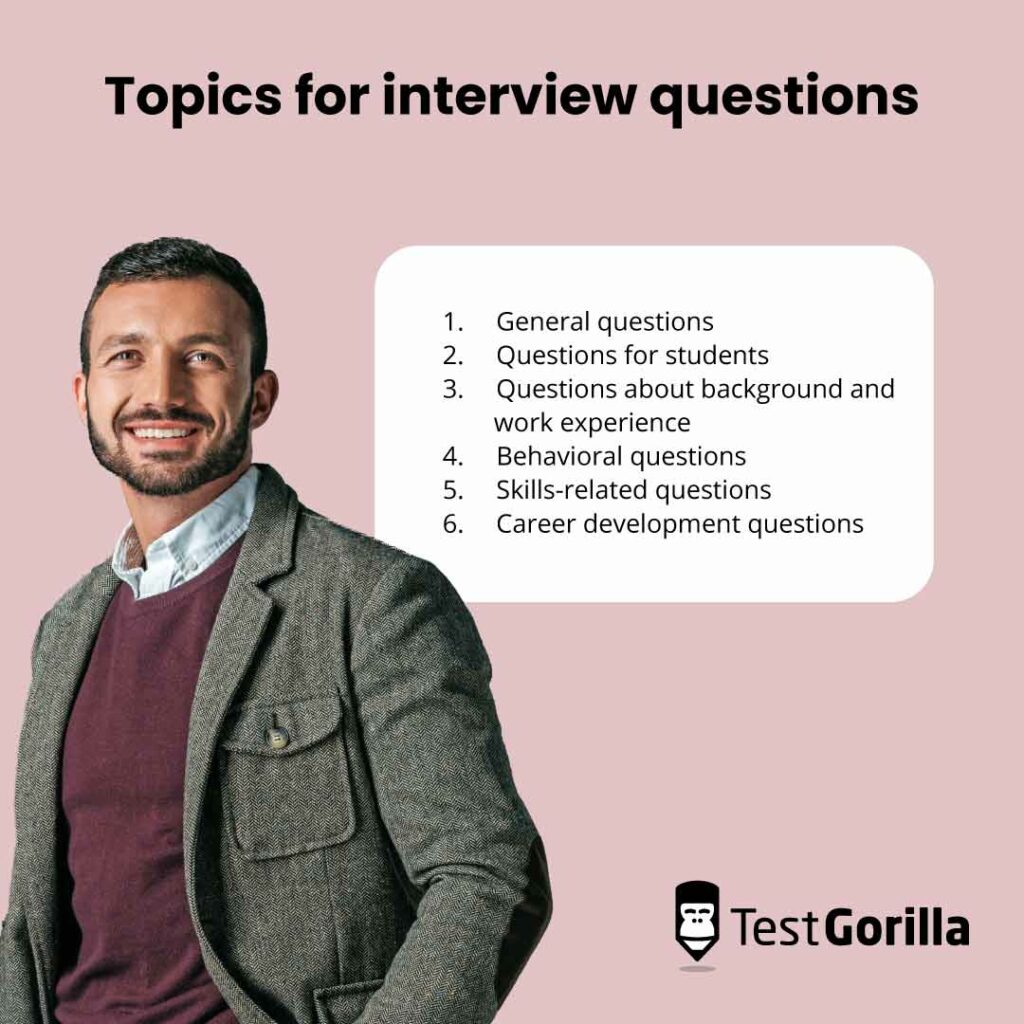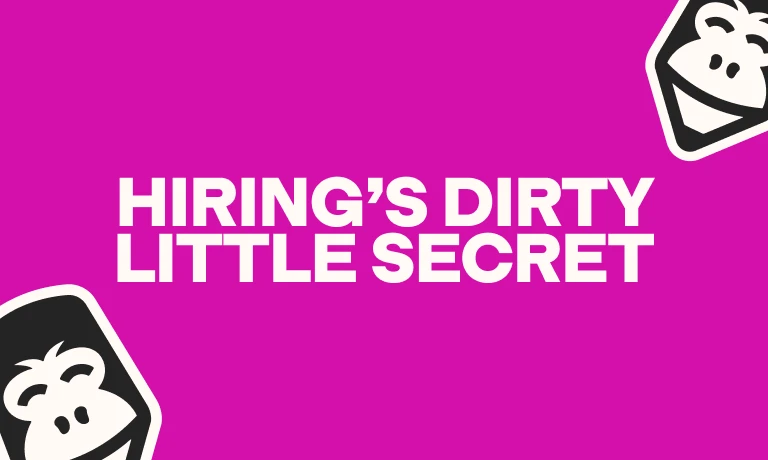A hiring manager’s guide to common interview topics plus examples
Preparing for an interview as a hiring manager ensures you ask the right questions. Candidates may be interviewing with many companies, so it’s essential to stand out – you can miss out on the best talent if you can’t hold engaging and unique conversations.
The interviewing process helps you explore each candidate’s personality, background, and career aspirations. Discovering a candidate’s potential requires you to ask in-depth questions that enable them to discuss their thoughts, ideas, and goals. However, thinking of the right interview questions isn’t easy.
So, if you’re a recruiter looking for common interview topics, you’ve found the perfect guide. Keep reading to discover the best topics for interview questions.
What are good interview topics?
The best interview topics are engaging conversation starters you can use to learn about your candidates’ skills and experience. Topics often range from the applicant’s educational background to their behaviors in the workplace.
One example of an interview topic is work experience. Learning more about your candidate’s previous roles can help you better understand their current skills and discuss potential opportunities within the team.
A study of 500 job seekers found that 58% of candidates decline job offers because of a poor interview experience. To make things worse, 71% share their negative candidate experiences with others, with 35% sharing them online.
These findings suggest that asking the right questions is critical for engaging candidates and discovering more about their talents.
60 great topics for interview questions
You can cover many topics in one interview, but you don’t want it to feel crammed. A candidate should be able to answer questions at a good pace without feeling overwhelmed. Choose interesting interview topics that suit your organization, interview style, schedule, and open position.
Below are some topics for interview questions:
General questions
Basic topics for interview questions can help kick-start a conversation in which candidates tell you more about their personality and reason for applying for the job. If you want them to feel comfortable, begin the interview with general queries that cover their prominent traits.
Tell me more about yourself.
Why have you chosen this particular job?
What are your strengths?
Why do you want to work for this company?
What are some of your hobbies?
What are your greatest weaknesses?
How do you like to be managed?
Is there anything I should know that isn’t on your resume?
What is your dream job?
Tell me about your work style.
Questions for students
Covering the right interview topics for students can help you identify their goals and strengths. It’s important to learn more about their current education and how they plan on working alongside studying.
What courses are you taking?
What are your future career plans?
Tell me about the skills you’ve gained at university.
Tell me about any extracurricular activities you’re involved in.
Do you have any work experience?
What do you enjoy most in your courses?
Are you willing to work on weekends?
How will you balance work and study time?
Would you be interested in receiving training?
Are you comfortable with completing the tasks involved in this job?
Questions about background and work experience
Don’t forget to ask about candidates’ work experience and how it benefits their performance. You can give them questions about similar roles or even non-paid work they’ve done in the past. You should include these questions in your interview to discover the candidate’s top strengths and weaknesses.
Describe any related work experience you have.
Do you think you have the skills required for this role?
Can you tell me about some of your proudest achievements?
Which job gave you the most knowledge?
Have you done any non-paid work?
Tell me more about your most recent job.
How does past work experience prepare you for this job?
Are you interested in volunteering?
How have you used your past experiences to improve?
Why did you leave your previous job?
Behavioral questions
Behavioral questions can help you determine whether the candidate will be a great team worker. It’s vital to learn about their mindset and responses to challenging situations when solving conflict among team members. Learning about their approaches to these situations can help you understand how they may work with your team.
What is your leadership style?
How do you manage stress at work?
What tasks challenge you the most?
Tell me about a time you had to handle conflict on the job.
Do you enjoy working as part of a team?
What do you do if an employee disagrees with your plan?
Take me through your decision-making process.
How do you motivate yourself?
What helps you to concentrate and be productive?
How do you overcome mistakes in the workplace?
Skills-related questions
Asking the right questions in the interview will reveal candidates who don’t have the right skills. You can ask questions to determine their current talents and knowledge. For example, suppose the candidate needs strong communication skills. In that case, you could ask them about a time they engaged with team members effectively.
How would you organize a last-minute project?
Tell me about a time you couldn’t meet a deadline and why.
How do you ask a colleague for help?
Do you seek more leadership-based roles?
What does good customer service look like?
How do you communicate effectively over text?
Describe how you would handle a huge workload.
What is the most important part of teamwork to you?
What skills do you value the most?
Are there any skills you need to work on?
Career development questions
Hiring the best talent is crucial for your business, but there’s no point in recruiting candidates who don’t want to stay in your company for long. You should ask questions about their plans and how they might use their specific talents to succeed and improve in the position.
Asking the right questions can also help you create training sessions for the applicant you hire.
What are your future career goals?
How do you want to improve your skills in this job?
What are you most passionate about right now?
Do you plan on completing more education?
Can you tell me about any short-term goals you have?
What would success in this job look like for you?
Do you require training for specific skills?
Are you interested in leadership programs?
What aspects of this job could fuel your personal growth?
How long are you planning to pursue this type of career?
The best insights on HR and recruitment, delivered to your inbox.
Biweekly updates. No spam. Unsubscribe any time.
Planning your interview topics during the recruitment process
Choosing interesting topics for interview questions can help you understand more about your candidate’s personality, skills, and work experience. Before starting the interview stage, ensure you ask candidates to complete high-quality skills tests like those created by TestGorilla.
These comprehensive assessments give you unique insights into applicants’ personalities and expertise and will help you prepare your interview questions quickly. Sign up for free, and plan your interview topics efficiently with TestGorilla.
Related posts
You've scrolled this far
Why not try TestGorilla for free, and see what happens when you put skills first.



















